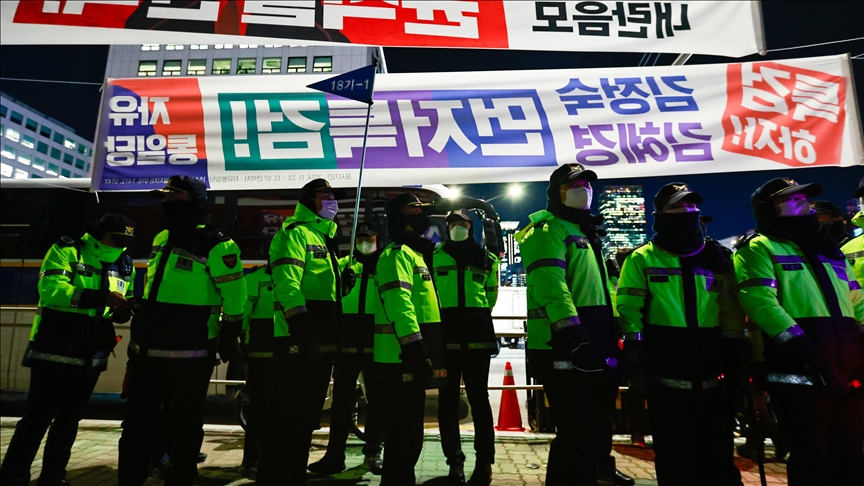ISTANBUL
North Korea has maintained a conspicuous silence over the dramatic events that unfolded in South Korea starting Tuesday night, when President Yoon Suk Yeol made the shocking decision to impose a failed martial law.
The martial law, reversed within six hours, has since triggered an impeachment vote against Yoon. Even the chief of Yoon’s own People Power Party (PPP) has called for suspending his presidential powers.
Despite the ongoing political turmoil and unrelenting protests in Seoul demanding Yoon’s ouster, Pyongyang has remained silent, offering no comment on the developments four days later.
Yoon declared imposing martial law at 10.25 p.m. Tuesday (1325GMT) but announced lifting it within six hours at 4.27 a.m. Wednesday (1927GMT, Tuesday).
Imposing martial law was necessary to “protect the country from North Korea’s communist forces and to eliminate anti-state elements,” Yoon, 63, told nation in a late-night address.
Without sharing any details of threats posed by Pyongyang, Yoon accused the main opposition Democratic Party (DP) of “paralyzing governance solely for the sake of impeachments, special investigations, and shielding their leader from justice.”
His shocking move to impose martial law, 17th time since 1948, came amidst concerns over security situation on Korean Peninsula.
Yoon’s predecessor Moon Jae-in had described the situation on the Korean Peninsula as “most dangerous” since the Korean War.
Interestingly, when former South Korean President Park Geun-hye was ousted from his office in 2016, Pyongyang reacted almost 24 hours later.
But when South Korean Constitutional Court confirmed Park’s ouster in March 2017, Pyongyang was quick to report the events in Seoul.
In 2009, when the top court dismissed a motion to impeach then-President Roh Moo-hyun, it took Pyongyang two days to react.
Many troubles of Yoon, the former prosecutor
The political tensions escalated in South Korea after the PPP lost majority in the 300-seat parliament, giving boost to Democratic Party-led opposition bloc.
Some 22 impeachment motions — including 10 since this June — were moved against Yoon’s administration by opposition bloc since he was elected in 2022 for a five-year term.
His administration has not been able to even pass budget.
The beleaguered 63-year-old leader had to veto three bills seeking special probe in to his wife Kim Keon Hee over graft.
The duo is also accused of meddling in the ruling party’s candidate nomination process during 2022 elections.
Yoon, who was prosecutor before joining politics, and his administration has also vetoed a bill which sought a probe into death of a marine who drowned while on a rescue mission during floods last year.
The deceased marine, and his colleagues, did not wear life jackets.
Under Yoon administration, South Korea has also witnessed one of the longest strikes by the medical community.
The junior doctors are on walkout from work since February against Yoon administration’s decision to increase annual number of medical seats.
Yoon has also faced music over his decision to operate presidential office from Defense Ministry compound instead of Blue House.
It is estimated to have cost around $40 million and has triggered criticism that Yoon’s move threatened national security.
During his trip to the New York in 2022, Yoon was caught “cursing” on a hot mic, following his meeting with US President Joe Biden.
While South Korean opposition lawmakers accused Yoon of “insulting” the US Congress, the presidential office in Seoul rushed to deny the allegations, saying he was referring to the South Korean parliament.
Moreover, Yoon’s administration has seen relations with North Korea deteriorate to new lows. The divided Koreas have terminated nearly all agreements, while Pyongyang has launched ballistic and other missiles, citing what it calls “reckless” activities by the trilateral alliance of South Korea, the US, and Japan.
Yoon’s fate hangs in balance
Six-party opposition bloc of 192 lawmakers needs at least eight votes from the ruling PPP to oust Yoon.
The incumbent president’s fate will be decided Saturday when lawmakers vote in the parliament, hub of anti-Yoon demonstrations since Tuesday night.
While removing an official requires simple majority of the lawmakers, any impeachment motion against the president needs two-thirds majority, i.e. at least support 200 lawmakers of 300-seat Parliament.
Any successful impeachment vote against a sitting president in South Korea has to undergo a trial at Constitutional Court which may take up to six months.
If the dismissal by lawmakers is confirmed by the court, presidential elections must be held within 60 days since the day court order is pronounced.
Elections must also be held within two months if a president resigns.
Yoon has given no indication of stepping down, instead many of his aides have resigned or have been removed.
Three military commanders have been suspended for deploying soldiers to the parliament after Yoon imposed the martial law.
After demanding presidential authority be suspended, ruling PPP leader Han Han Dong-hoon met Yoon but said he heard nothing from the president that could change his stance.

